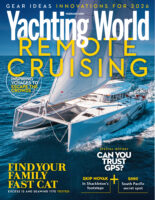Two BT Challenge skippers are fighting for their hard-won places against penalty decisions
Two BT Challenge crews are fighting to keep their hard-won places on this last Southern Ocean leg after the international jury imposed penalties equivalent to two places. Norwich Union, which had their best result of the race to finish 2nd, lost their No 1 yankee over the side during the leg and the jury say they are docking two points. This is equivalent to two places and knocks them off their podium place for the leg.
Isle of Man lost most of the fabric of their 1.5 oz spinnaker in a spectacular broach and were left with just the clews and tapes. The class rules say that if the sail is beyond economic repair, two penalty points should be applied. That will drop Lin Parker’s crew from 7th to 9th place.
Both Parker and Neil Murray are challenging the decisions. Murray has already been through the race rules carefully and says that while they are specific about sails beyond economic repair, there’s nothing there about losing sails over the side. He says he recognises that this is a mistake and appreciates that spirit of the rules is behind the jury’s decision, but that it’s the letter of the law that counts and he will appeal to ISAF if necessary.
“It would seem that when the rules for the race were written an error was made and they [the RORC] omitted to use that wording that was used for the previous race,” says Murray. “I’m sure there will be an amendment to close that loophole, but it is a loophole and I expect to win the appeal.”
Isle of Man’s case is different, because it is covered by the class rules and they are specific. But she, too, is fighting her corner.
Understandably, other skippers have different views. Richard Chenery of Quadstone stands to move up to 2nd place if Norwich Union are penalised. What does he think of them getting docked by two points? “That would be handy, wouldn’t it?” he smiles. And if they aren’t penalised, what then? “I would have to consider action,” he says.
Whatever the outcome, someone will be unhappy. And yet again, the two situations highlight the contentious nature of some of the international jury’s decisions in this race.
Like most skippers, Murray is critical of the jury, which reaches its decisions by e-mail. “The e-mail jury have made several decisions and imposed penalties on several yachts and overturned them 24 hours later after an appeal,” he says. He adds that some decisions have seemed out of kilter with the spirit of the race, citing the case of Logica motoring to have a sick crewmember airlifted off and misunderstanding where they could motor back to resume the race, and the one-point penalty given to Save the Children for inadvertently having their engine in gear for 20 minutes while charging their engine in the Southern Ocean. That was later rescinded.
“There is an overall feeling in the fleet of dissatisfaction and mistrust both because of the quality of the jury’s decisions and their complete lack of understanding of the spirit of the race,” says Murray vehemently. “They’re completely out of touch and applying the rules in a completely inappropriate way.”
“It’s difficult having protests settled by e-mail while you’re at sea,” he continues. “You can’t have an effective hearing because you can’t put your case face to face.” He believes the solution is relatively simple. “There should be at least one person on the jury who understands the race and they should be more decisive.”



